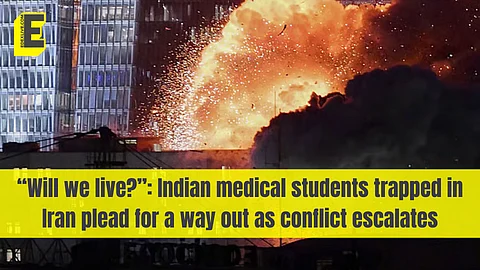

As the skies above Tehran light up once again, the situation for Indian medical students has shifted from tense to urgent. What began as Israel's massive Operation Rising Lion on June 12-13 has spiraled into a dangerous cycle of retaliation that has left foreign students stranded in one of the world's most volatile flashpoints.
Last night’s assault involved over 200 fighter jets from Israel, striking more than 100 Iranian military and nuclear installations across Tehran, Isfahan, and Natanz.
The operation reportedly killed up to 90 people, including senior Revolutionary Guard commanders Hossein Salami and Mohammad Bagheri, along with key nuclear scientists, while wounding over 320 civilians.
Iran's nuclear facilities at Fordow and Isfahan bore the brunt of the attack, according to UN nuclear watchdog chief Rafael Grossi.
In a swift and deadly response, Iran launched a barrage of missiles and drones at Israeli cities hours later, targeting Tel Aviv, Haifa, and key military bases in the south. Israeli defense systems intercepted several of these, but some caused structural damage and casualties on the ground. The tit-for-tat escalation has pushed the region into what many fear could become a full-scale war.
In Tehran’s dormitories, students lay awake as sirens wailed and explosions shook their buildings. Sheikh Azhan, a third-year MBBS student at Shahid Beheshti University, recalls the terror of the night: “Around 1 am, we heard loud explosions. Hundreds of missiles were visible in the sky right above us.”
As missiles rained down and air defenses roared, fear hardened into despair and helplessness. On June 13, a missile struck close to the women’s dormitory at Tehran University, prompting the deployment of air defense systems just outside.
“The nights are filled with sirens and the thunder of missiles streaking overhead from both sides. Sleep is impossible, with balcony doors rattling from the shockwaves of nearby blasts,” says Mohammad Rayyan, a fourth-year student at Tehran University.
The students’ pleas for evacuation have met with bureaucratic limitations.
While students from Iraq, Pakistan, and other bordering nations have begun to leave via land routes, Indians have no such option. Despite meetings held at their universities and communication efforts by the All Indian Medical Students’ Association (AIMSA), students report minimal guidance from the Indian Embassy.
India’s diplomatic missions have initiated contact, with External Affairs Minister S Jaishankar engaging both Iranian Foreign Minister Seyed Abbas Araghchi and his Israeli counterpart Gideon Sa'ar. The Indian missions in Tehran and Tel Aviv maintain active contact with their nationals, though concrete evacuation plans remain elusive.
The embassy's guidance to “remain in dormitories” offers cold comfort to students watching their academic futures dissolve in missile fire.
Dr Mohammad Momin Khan, State Vice-President of the All India Medical Students' Association (AIMSA), has received hundreds of calls from desperate parents as their children remain stranded in an active war zone.
The students themselves, having invested years and substantial resources in their medical education, now face an agonising uncertainty about their survival, let alone their academic future.
“I urgently appeal to the Government of India to evacuate Indian medical students currently stranded in Iran. Their families are in deep distress amid the escalating Iran-Israel conflict. Immediate action is needed to ensure the safety and well-being of our students,” says Dr Momin.
As examinations are cancelled and universities shift to online modes, these young Indians find themselves witnesses to history’s unfolding violence. Their dormitories, once sanctuaries of learning, have become front-row seats to a conflict that threatens to reshape the Middle East.
As missiles continue to light up Tehran's night sky, these students embody the human cost of geopolitical conflict, their academic aspirations suspended in the balance of regional warfare.
In the darkness, Rayyan’s haunting question echoes louder than any siren: “Will we live? Will we have a future?” a plea not just for safety, but for survival itself.
